Why We Still Love Digimon
by Jacob Chapman,At the turn of the millennium, Japan was burning up with a contagious monster fever. Pokemon had become a worldwide phenomenon, and all sorts of other monster-based children's franchises began flooding the market. There was the Tamagotchi, there was Monster Rancher, and of course, there was Digimon: Digital Monsters. Many of these titles were immediately dismissed as Pokemon imitators, with Digimon only earning the honor of loudest bridesmaid. It never had a prayer of stealing Pokemon's commercial success, but there were always a few kids trading those "other" cards on the playground and watching that monster show on Fox Kids instead of that monster show on Kids' WB.

Personally, I was in an even smaller group of kids watching both shows, so I was always confused (and later annoyed) when people said that they were all the same junk, or that one was an inferior version of the other. Even as a child, I remember being fascinated by how completely different they were. Pokemon took place in a world controlled by humans. Digimon took place in a world controlled by monsters. Pokemon evolution was permanent, based on growth and experience like a natural life cycle. Digimon evolution was temporary, based on big moments of emotional catharsis and the need to overcome impossible odds. Pokemon were split into animal species that made critter-sounds and followed instinctual behaviors and basic commands from their trainers. Digimon were individuals that could reason, talk, and often came programmed with the desire to either bond with human partners or destroy mankind.
Still, these were superficial differences that didn't make a lick of difference to the average kid looking to find friends in the monster craze. As a popularity contest, it was no contest at all. More kids were playing Pokemon games. More kids were trading Pokemon cards. More kids watched the Pokemon anime. Pokemon was the clear winner, and the Digimon kids remained an eternally vocal minority. So as the years went by, it only made sense for this monster maid of honor to shuffle away from the monster bride's special day and disappear into the night.
Except it didn't disappear. Not only did Digimon stick around, it evolved in a way that its more commercial cousin could never copy: it grew up with its fans.

Like most successful children's franchises, Pokemon has kept its focus forever on the kiddos. Ash and Pikachu's episodic adventures never really change and that's okay, just like Scooby-Doo and Spongebob never need to grow past their eternal status quo. With Toei's announcement of a Digimon tri movie series, Digimon proved that it had been holding onto a more ambitious kind of strength for over 15 years. It followed the Harry Potter path of cultivating a story and characters that remained meaningful to its fans as they grew from children to teens to adults. Just looking at the poster for Digimon tri yields profound emotions in fans of "coming home" to something years later as a very different person, but with no less love in your heart.
Clearly, Digimon has endured on the power of its story and characters above all else, since Digimon tri is actually a conclusion to the two TV seasons that came over a decade before: Digimon Adventure and Adventure 02. So for those who gave this "lesser monster thing" a pass in the late '90s, this article will shed some light on the emotional victory that the Digimon anime had on fans, regardless of how many games or toys it sold. It all began with...

"Gotta catch 'em all!" It's the Pokemon motto and raison d'etre of every aspiring trainer. Even if Ash didn't complete his Pokedex with one of every species (and he most certainly didn't), his goal was to battle his way to the top with a diverse and shifting team of specialized monsters. He was the center of the show, and while they did have personalities of their own, his Pokemon were mostly the "power in his hand," specialized comrades that Ash could let out for a task and then put back in his pocket with ease. He had rivals like Gary, companions like Misty and Brock, and enemies like Team Rocket, but they all had pretty identical relationships to their monsters: they fight faithfully in service of their trainer's goal. As the everykid, Ash's journey was the only one that really mattered, and everyone else played the roles they needed to support his neverending quest.
Digimon played by very different rules, and unlike Pokemon, it wasn't a one-player adventure. There were eight Digidestined (or Chosen Children if you prefer the Japanese version), and they only had one Digimon partner waiting to guide each of them on their destined path. Getting spirited away to a computerized dimension with half a dozen strangers was overwhelming enough, but unlike Pokemon trainers, these kids didn't get to choose their monster once their adventure began. Each Digimon introduced themselves to their new human with a little too much enthusiasm, explaining that they'd been waiting for them to arrive for many years, and if the kids could accept them, they would be bonded for life. The situation wasn't immediately ideal, but the monsters couldn't fight without the kids, and the kids couldn't survive in the Digital World without the monsters. So these partnerships started out circumstantial and grew warmer with time, just like any other friendship might evolve.
Speaking of evolution, Digimon could only digivolve when their bond with a partner had deepened, putting the onus on these kids not to learn new fighting strategies, but become stronger people at heart. Because every kid and monster was so different, this wide range of partnerships allowed fans to relate to dozens of different situations throughout the story.
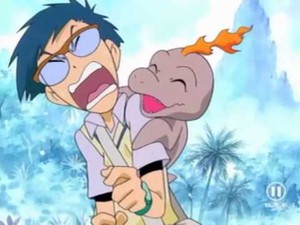

Sometimes the strongest relationships came from the least important members of the cast. Joe and Gomamon were always at the tail end of any Digimon cast lineup, but their arc was just as memorable as everyone else's. As the oldest kid in the group and an aspiring doctor, Joe saw himself as the group's protector. Unfortunately, the other kids only saw him as the group worrywart, who dispensed useless "practical" advice in a fantastical world and bumbled awkwardly away from the fun-loving Gomamon every chance he could get. When Joe would flip out about something, Gomamon would just laugh and flipper-wave it, which didn't help settle Joe's nerves at all. Gomamon was also the weakest of the monsters physically, so Joe often found himself flinging his noodle-body into harm's way to defend the creature who was supposed to be protecting him. They didn't turn the tide of many battles, but they formed two opposite extremes of emotional support for the team that brought out the best in all their scenes.

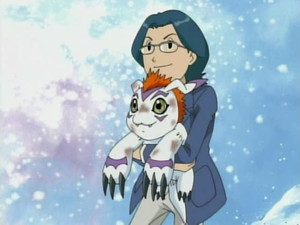
As each episode passed, their initially rocky relationship grew more tender and brotherly. Joe eventually realized that being Team Dad meant learning to let go and trust the other kids and monsters he felt so responsible for. He could stand to lighten up and make mistakes along with them. Gomamon could only digivolve when Joe grew as not only a caretaker but a loyal friend to the others around him. Kids may have started out laughing at his histrionics, but Joe inspired his fellow introverts to face their social fears and accept themselves without judging the more boisterous clowns around them too harshly.
Joe's arc could have made a great kids' show all by itself, but there were seven other children who all had strong relationships with their partners, whether they were wildly different (Mimi was frivolous while Palmon was humble) or kindred spirits (Izzy and Tentomon fed off each other's thirst for knowledge). At the same time, the Digimon could only do so much as creatures in support of their respective humans. The show often spoke strongest when it was about the Digidestined's relationships with other people.

Every little nerdling I knew loved Izzy. In a world full of cartoons with stereotypical "nerd" characters that spouted facts, didn't get jokes, and didn't have emotions, Izzy was a nerd that reflected us as we saw ourselves. He wasn't perfect and his obsessive personality could cause problems in the group sometimes, but his inquisitive mind was always praised instead of mocked. The other kids didn't usually understand Izzy, but they grew to appreciate his talents, and their approval made him want to share his curiosity with others. Eventually, we found out that Izzy had his reasons for preferring computers over people. As a very small child, he accidentally overheard his parents discussing his adoption history: he wasn't their biological son, and they didn't know that he had found out.

This pattern of being too smart for his own good followed Izzy throughout his childhood. He didn't want his knowledge to hurt anybody's feelings, but he didn't know how to express himself without alienating his peers. So he became invested in the world of zeroes and ones, where every problem had a solution if you just thought about it hard enough. At one point, when he became too overwhelmed by problems that he couldn't solve, Izzy almost gave up his curiosity (to a literal "curiosity shop") so he wouldn't have to think or feel anymore at all. The acceptance of others, even if they didn't understand him, allowed Izzy to slowly open up again and even come clean with his adoptive parents so they could cry everything out together. Digimon was the first cartoon I ever saw that treated nerds like real people, allowing me to really see myself in a fictional person my own age.

Of course, Digimon wasn't primarily a show about kids exploring their feelings. (That was just an added bonus.) This was a show about monsters, and they needed something to fight!
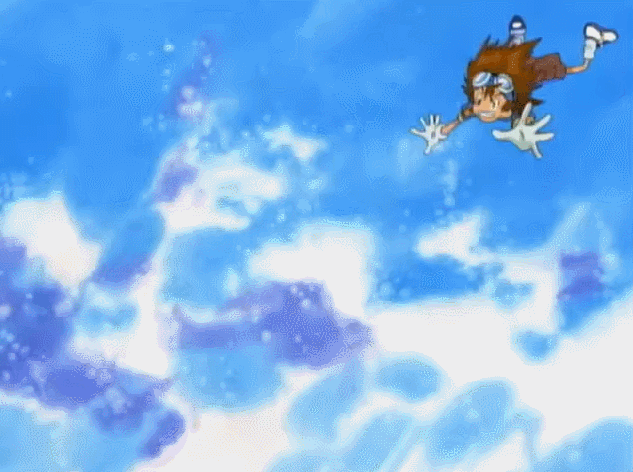
"We all live in a Pokemon world!" As a kid, I always felt a little bitter about that part of the Orange Islands theme song. I would love to live in a Pokemon world, and I know I wasn't the only one! It seemed like absolutely every kid in the world of Pokemon was special. Nothing that bad ever really happened to anybody, and Ash's life in particular was just one big vacation after another, with only minor (and often exciting) threats to break up the endless fun of his Pokemon training journey. It was a wonderful world to get lost in, but after a few dozen episodes of life-affirming battles with new friends and monsters that our heroes would probably never see again, I started to realize that endless escapism wasn't necessarily a hallmark of great storytelling. Part of me wanted a monster story with a little more bite.
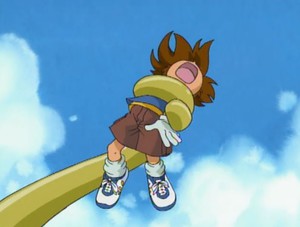
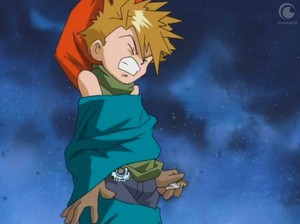

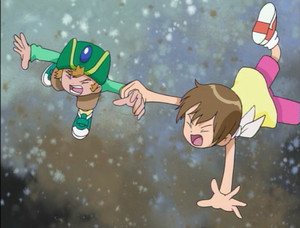
From the second they set foot in the Digital World, the Digidestined were a perpetual breath away from becoming monster chow. Giant beetles tried to snap them up, horrible ogres tried to crush them with clubs, and they even got attacked by literal vampires out for blood! Rather than being a series of wacky escapades, Digimon was a serialized narrative with a continuous story, so our heroes were always on some harrowing path to a giant showdown. First they had to learn the rules of the Digital World on their way to dethrone the tyrannical Devimon. After that, they had to hunt down magical crests powered by the virtues closest to each kid's heart: Courage, Sincerity, Hope, and so on. They wouldn't even learn how to use these crests for a long time to come, as their fight led them back to the real world to stop the Dracula-like Myotismon from enslaving mankind.
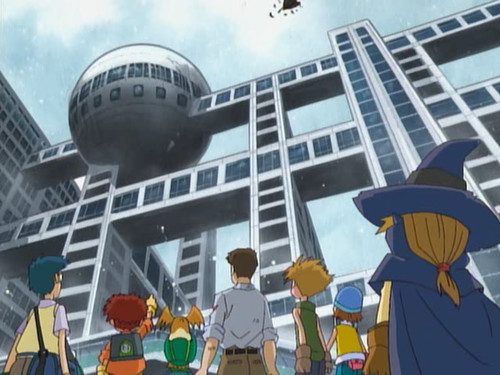
The Myotismon arc formed the strongest part of the series, because not only were the kids fighting evil on their home turf, (the monsters are blowing up real buildings! and trying to eat the populace!) they also had to explain the existence of Digimon to their parents and deal with relatable family struggles amongst all the monster chaos. This effect was probably even more powerful for Japanese viewers, since the show based its battles in real locations and even centered the final fight around the Fuji TV building the show was broadcast from! The stakes hadn't lessened by the time Myotismon was defeated and the gang was ready to head back to the Digital World though. The final fight against a horrific gestalt wad of despair named Apocalymon cost the lives of several supporting cast members, as the world darkened into gray stone and pretzeled itself into the ominous Spiral Mountain that loomed over the show's final quarter.
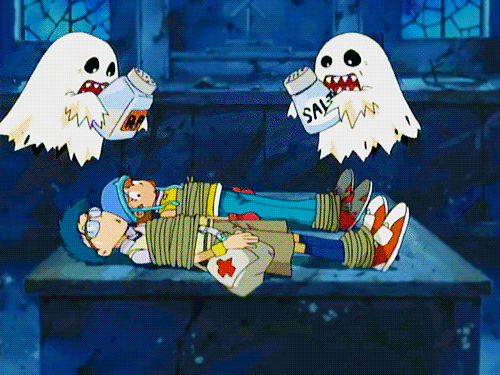
Still, it was called Digimon Adventure for a reason. Whenever the stakes got too high or the drama too dark, there was a sillier conflict waiting in the wings. Mimi's episodes provided the most levity, and it was also refreshing to see a female character as the most active source of comedy in the cast. She and Palmon had a boxing match with a giant teddy bear, a singing contest with a colony of frogs, and even an unfortunate poo-flinging standoff with an army of trash-monsters. (It was pink poop, so it was totally okay to air on TV!) Even during the Myotismon arc, Mimi and her eccentric parents were seen fleeing ghost-monsters with cartoonish energy, piling into an elevator and smacking at them with a broom.
Whether serious or silly, the Digidestined always had a challenge to conquer, but sometimes these fights erupted within the group itself. The Chosen Children basically had two leaders, and right from the start, they didn't get along so well.
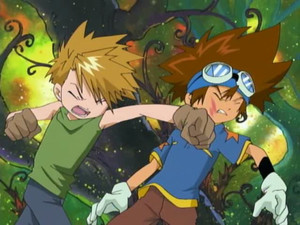

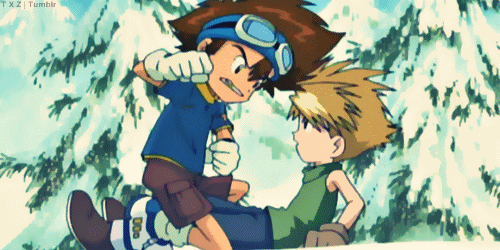
Tai and Matt didn't really hate each other, but they argued about ten times more than they agreed. Tai was all fiery bravado and reckless pride, while Matt was a thoughtful brooder with a penchant for passive-aggression. Just like the other kids, Tai and Matt's personality problems were actually rooted in sympathetic struggles, both related to their younger siblings.
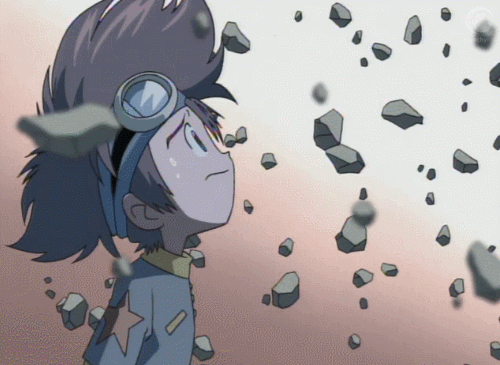
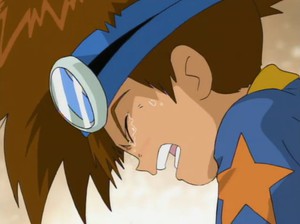
Tai was just beginning to reach an age of maturity that he didn't know how to deal with. He was starting to recognize the weight that his often childish actions had on other people, but he had no idea how to become a responsible person and that scared him. When his little sister Kari joins the group as the eighth chosen child and comes down with a bad fever while they're stranded in the Digital World, Tai is overwhelmed by memories of his past failures as an older brother. Kari was a very sickly little girl, and Tai was tired of being stuck inside watching her while his parents were away at work. He wanted to play soccer instead, so he dragged her outside with him and the exertion eventually sent her into critical condition. This scared Tai so badly that he started keeping his sister at arm's length, and he finds himself paralyzed with indecision when her addition to his adventure becomes a responsibility he's terrified he can't handle again.
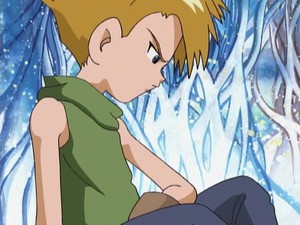
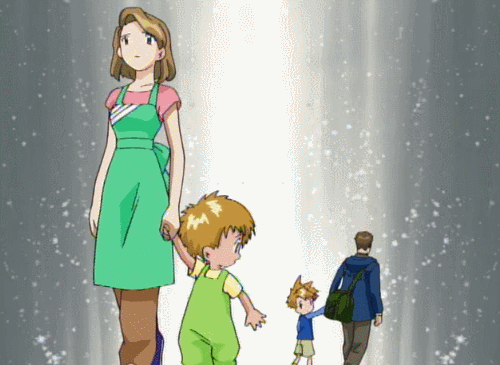
Matt was a child of divorced parents, and while I didn't grow up in that situation myself, the resonance his story had on my friends with separated families was strong. Matt stayed with his father while his little brother T.K. (another Digidestined) stayed with his mother most of the time. They saw each other on the weekends, but he could feel himself growing more distant from his brother, and when T.K. began growing up without him and starting to admire Tai more, this drove Matt over the edge. Fighting feelings of abandonment and inferiority, he always put the safety and feelings of others first, but had no idea how to deal with his own emotions. He relegated himself to his own cool void, secretly terrified of ending up alone. Unlike Tai, he understood how to be a responsible older brother, but trying to be too grown-up for his own good only isolated him from people his own age who could help.


By the end of the first season, both rivals realized they had more in common than they initially thought. Their newfound friendship remained a little rough around the edges (and sharing a love triangle over Sora in the sequel didn't help), but once they were able to overcome their individual issues, they finally achieved the new level of maturity they'd both been looking for. The viewers their age felt like they grew up a little along with the two leads, and we all got some sweet new Mega-level Digivolutions out of the deal.
Speaking of growing up...
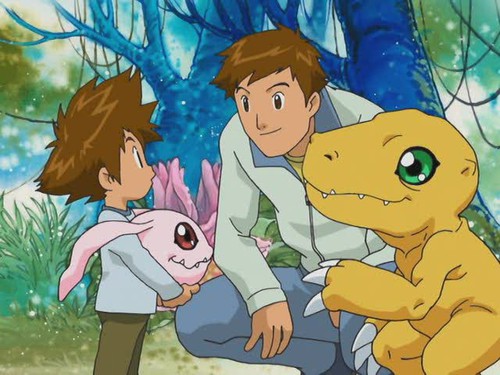
Digimon Adventure 02 introduced a new cast of kids to the Digital World and put the cast of the first season on the sidelines, but the original Chosen Children never really left the story. Large swaths of episodes were devoted to the old gang discussing their new roles as mentors in the conflict, the need to balance the fight with their teenage responsibilities, and even frequent hints at the more grown-up romantic woes some characters were facing. They didn't have the power to fight new Digimon threats on their own anymore, but their lives were still extremely important to the story, which is why there were so many pictures of their older selves available for me to sprinkle through the article.
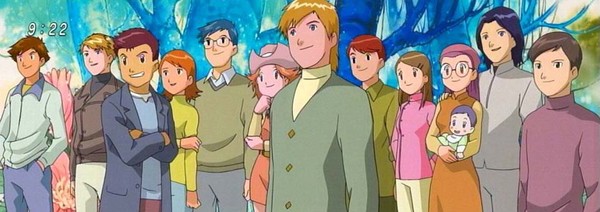
This established a precedent for Digimon that set it apart from many other kids' stories. No matter how old characters got, the Digital World always had a place for them. Digimon Adventure always understood that adults are a major part of childrens' lives, and adulthood is something that kids think about all the time. In the first season, the heroes' parents also played a surprisingly important role in the story. Sora's contentious relationship with her mother made her mission to rescue her mom from Myotismon much more meaningful, because she was really fighting for an opportunity to finally reconcile their differences. When the show decided to step away from the kids' perspectives entirely and show Matt's divorced parents awkwardly holding hands to reassure their sons, a lot of kids were deeply moved by the gesture, even though it was about adult emotions that they might not fully understand.
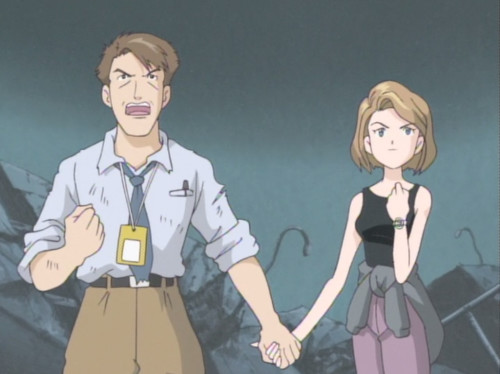
In fact, the final villain in the Adventure series (surprise return of Myotismon aside) wasn't a mustache-twirling monster, but a misunderstood adult that the kids had to try and understand before they could save him. Yukio Oikawa had dreams of going to the Digital World with his best friend as a child, but as they grew older and drifted apart, he became the only one left clinging to that childhood dream. After his estranged friend died in a car accident, Oikawa fell into despair, ready to give up anything to go to the Digital World and get his childhood back. After learning his story, Cody (a new Digidestined and the son of Oikawa's deceased friend) gained a new perspective on his father and what it really means to be an adult. He even helped Oikawa meet the partner Digimon who never stopped waiting for him, even after he grew up.

Digimon tri is a nostalgia vehicle for slightly older audiences because right from the start, Digimon Adventure created a world where it was not only okay to grow up, it was exciting. The series taught all its characters that growing up wasn't about letting go of fantasy or fun, but learning to connect with different kinds of people and be brave enough to let those relationships change you in surprising ways. Even when we were kids, Digimon was ready to assure us that we would never be too old for the emotions and adventures it was eager to share.
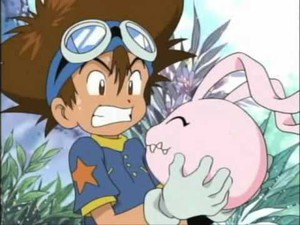


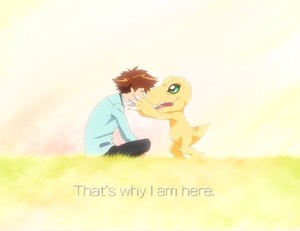
Fifteen years later, my feelings for Digimon have changed in many ways, but they sure haven't gotten any smaller. I'm sure the Digimon tri movies are going to hit me with a tidal wave of nostalgia, but I hope they'll also give me some fresh experiences that speak to me as strongly now as Adventure did when I was a child. What made Digimon special to you? Share your own stories with us in the forums!
discuss this in the forum (72 posts) |
this article has been modified since it was originally posted; see change history